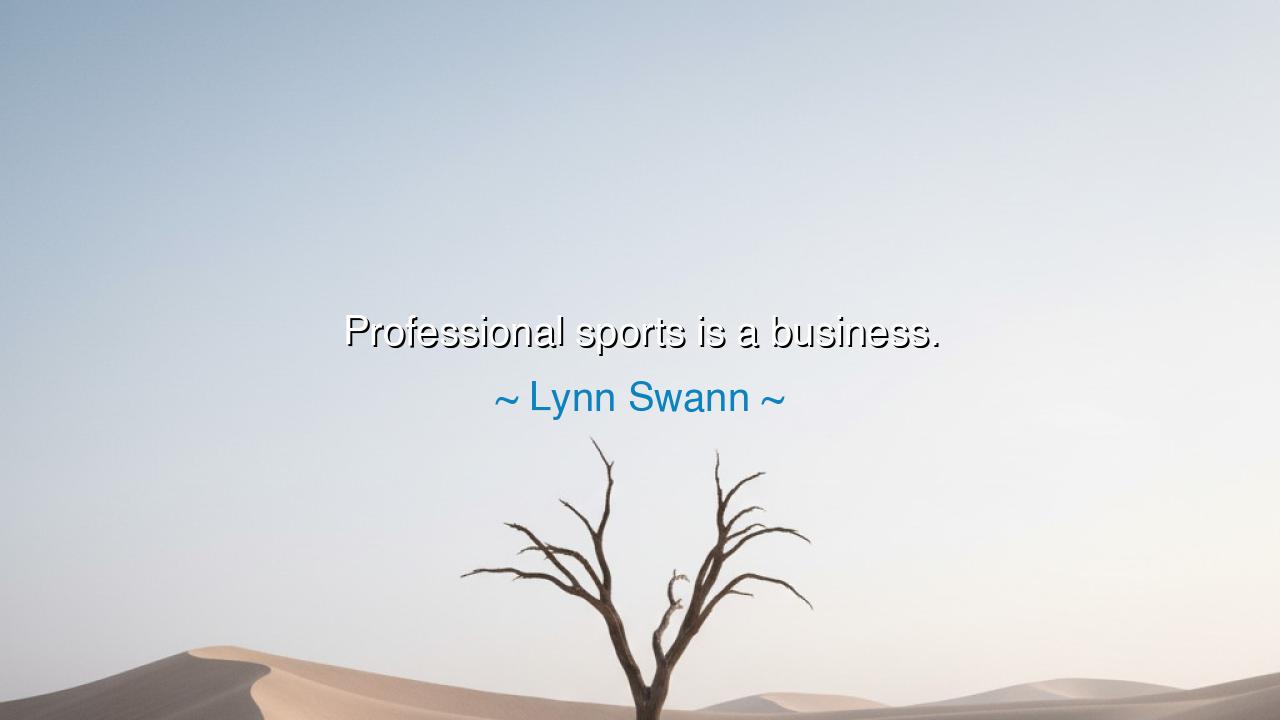
Professional sports is a business.






In the words of Lynn Swann, “Professional sports is a business.” This saying, though short, carries the weight of centuries of human struggle, ambition, and sacrifice. To the unknowing, sports appears as a pure contest of spirit and strength, a battle of wills, where heroes rise and fall by the measure of their courage. Yet Swann reminds us of the deeper truth—that beyond the shining fields and roaring crowds lies the machinery of coin, contract, and commerce. The arena is not merely sacred ground; it is also a marketplace.
Consider the gladiators of ancient Rome. To the people, these warriors seemed like gods, their contests stirring the soul of the empire. Yet behind the curtain, they were assets—bought, sold, trained, and managed by those who profited from their victories and deaths. The roar of the Colosseum was not only for glory, but also for profit. Even then, the truth Swann spoke was alive: sport is a business, where talent is harnessed not only for honor, but for wealth.
The tale of Curt Flood in the 1960s offers a modern echo of this eternal lesson. A brilliant baseball player, Flood refused to accept a trade that treated him as property to be moved without his consent. He challenged the reserve clause in court, sacrificing his career for the dignity of athletes as human beings. His battle revealed what Swann’s words capture: that while the field inspires dreams, behind it stands the system of ownership, negotiation, and profit. Athletes are not only warriors but also workers, bound by contracts, subject to the power of capital.
This truth may disillusion the romantic. One might say, “Where is the purity of the game, the child’s joy, the thrill of honest competition?” But wisdom teaches us that seeing clearly is no betrayal. Rather, it grants strength. For the athlete who knows the field is also a stage of business is prepared to guard his worth, to negotiate his value, and to protect his legacy. The one who remains blind risks being consumed by those who see only the balance sheet.
Yet let us not despair. To say sports is a business does not strip it of beauty. It reminds us that greatness requires discipline not only in body, but in mind. The athlete must be as skilled in judgment as in motion, as wise in contract as in competition. Michael Jordan, perhaps the greatest of his age, triumphed not only through unmatched skill on the court but also through keen understanding of his image, his endorsements, and his influence. His mastery was both athletic and financial, a marriage of glory and business that made his name eternal.
The lesson is for all who hear these words, not only for athletes. For each of us lives within systems where passion is entwined with profit. The poet, the craftsman, the healer—all must one day reckon with the business of their art. To ignore it is to risk exploitation; to face it is to claim power. Swann’s words ring as a reminder: know your worth, protect your value, and do not be naïve about the forces that move behind the curtain.
Therefore, my counsel is this: pursue your passion with the heart of a hero, but guard your labor with the wisdom of a sage. Do not let your spirit be diminished by commerce, but neither should you walk into the marketplace unarmed. Learn the language of contracts, the rhythm of negotiation, the balance of profit and purpose. For in this world, where even glory is bought and sold, only those who unite their fire with foresight endure.
So let us pass this teaching to our children: to love the game, but also to understand the business. To enter the field with joy, yet leave the table with dignity. For in truth, this is no contradiction, but the harmony of life itself—where heart and mind, spirit and substance, must walk together if we are to prevail.






AAdministratorAdministrator
Welcome, honored guests. Please leave a comment, we will respond soon